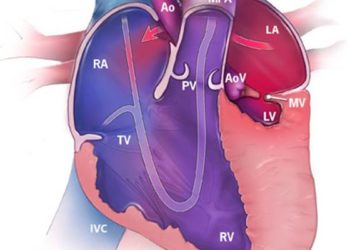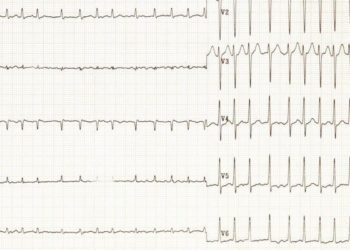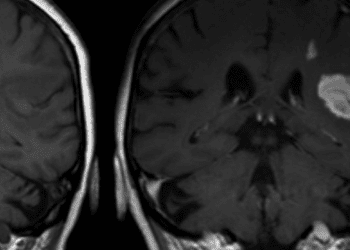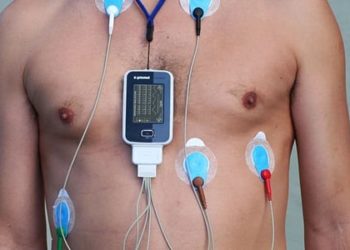Non-vitamin K oral anticoagulants associated with superior stroke prevention over warfarin among patients with nonvalvular atrial fibrillation
1. Non-vitamin K antagonist oral anticoagulants (NOACs) were associated with decreased stroke/ systemic embolism risk compared to warfarin among patients with nonvalvular atrial fibrillation at high risk for bleeding.
2. In comparison to warfarin, apixaban and dabigatran were associated with reduced risk of major bleeding; however, rivaroxaban was associated with increased risk for a major bleeding event.
Evidence Rating Level: 2 (Good)
Study Rundown: Management of atrial fibrillation (AF) involves oral anticoagulation to reduce stroke risk. Various oral anticoagulants (OACs) are used, including vitamin K antagonists and non-vitamin K antagonists, to prevent stroke without leaving the patient at high risk for major bleeding (MB). This secondary analysis of the ARISTOPHANES study investigated rates of stroke/systemic embolism (SE) and MB among patients with nonvalvular AF and a high risk of gastrointestinal (GI) bleeding; they were prescribed warfarin or a non-vitamin K antagonist OAC (NOAC) (apixaban, dabigatran, or rivaroxaban). All three NOACs demonstrated a lower risk of stroke/SE than warfarin. When assessing MB rates, those prescribed apixaban and dabigatran had reduced risk, whereas patients on rivaroxaban had a higher risk compared to warfarin. When comparing the NOACs to each other, those taking apixaban had a lower risk of stroke and a lower risk of MB compared to dabigatran and rivaroxaban. Overall, NOACs were superior to warfarin in reducing stroke risk; however, the risk of MB differed between NOACs. This was the largest study comparing NOACs and warfarin among this cohort of patients. This study was limited, however, by its retrospective nature, where no causal relationship could be determined between an oral anticoagulant and the desired outcomes. Furthermore, although bleeding rates were documented, no lab data or bloodwork, such as international normalized ratio, was recorded to compare bleeding risk.
Click to read the study in JAMA Network Open
Relevant Reading: Comparative risk of gastrointestinal bleeding with dabigatran, rivaroxaban, and warfarin: population based cohort study
In-Depth [retrospective cohort]: This subgroup analysis of the ARISTOPHANES study included 381 054 participants (81.6% of the ARISTOPHANES population) with nonvalvular AF and at least one risk factor for GI bleeding (prior medication [corticosteroids, antiplatelet, or NSAID], age >75 years, HAS-BLED score >3, prior GI bleed, stage III or greater chronic kidney disease). Participants were prescribed warfarin or a NOAC (apixaban, dabigatran, or rivaroxaban) between January 1, 2013, and September 30, 2015. The primary outcome was stroke/SE rates; the primary safety outcome was MB. The unadjusted incidence of stroke/SE was 2.3, 1.5, 1.7, and 1.6 per 100 person-years for those prescribed warfarin, apixaban, dabigatran, and rivaroxaban, respectively. The unadjusted incidence of MB was 7.0, 4.1, 4.3, and 6.4 per 100 person-years for those prescribed warfarin, apixaban, dabigatran, and rivaroxaban, respectively. Compared to warfarin, those prescribed apixaban (HR: 0.60 [95% CI: 0.52-0.68]), dabigatran (HR: 0.75 [95% CI: 0.64-0.88]), and rivaroxaban (HR: 0.79 [95% CI: 0.73-0.86]) had lower risk of stroke/SE. Compared to warfarin, those prescribed apixaban (HR: 0.59 [95% CI: 0.56-0.63]) and dabigatran (HR: 0.78 [95% CI: 0.70-0.86]) had a lower risk of MB; however, patients on rivaroxaban (HR: 1.11 [95% CI: 1.05-1.16]) had a higher risk of MB. When comparing NOACs, those prescribed apixaban had a lower risk of stroke/SE compared to rivaroxaban (HR: 0.74 [95% CI: 0.67-0.83]) and dabigatran (HR: 0.75 [95% CI: 0.62-0.91]). Additionally, apixaban demonstrated a lower risk of MB compared to rivaroxaban (HR: 0.55 [95% CI: 0.52-0.58]) and dabigatran (HR: 0.74 [95% CI: 0.62-0.88]).
Image: PD
©2021 2 Minute Medicine, Inc. All rights reserved. No works may be reproduced without expressed written consent from 2 Minute Medicine, Inc. Inquire about licensing here. No article should be construed as medical advice and is not intended as such by the authors or by 2 Minute Medicine, Inc.









